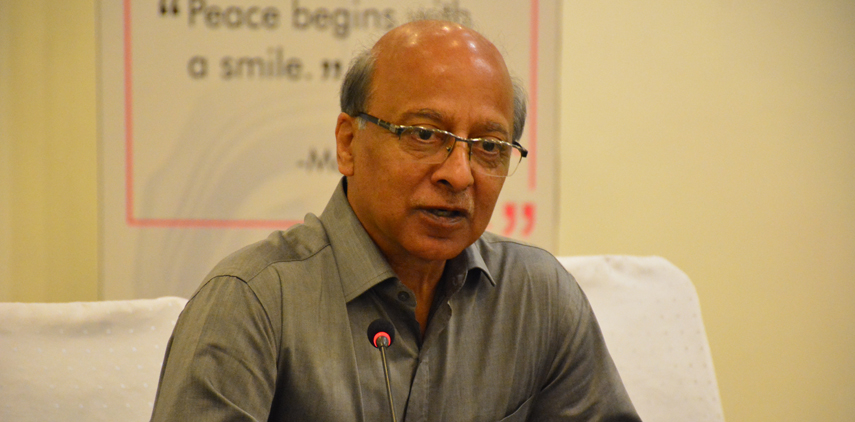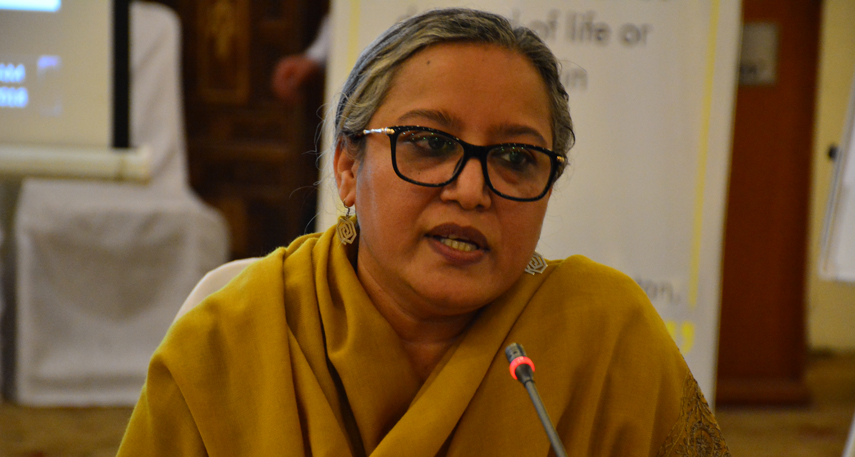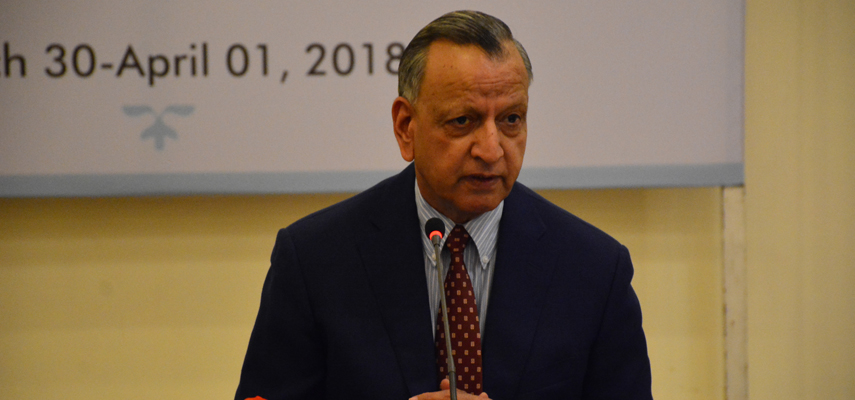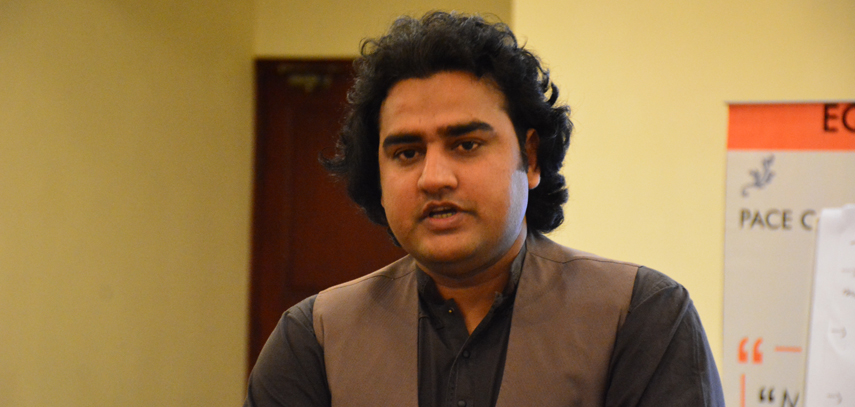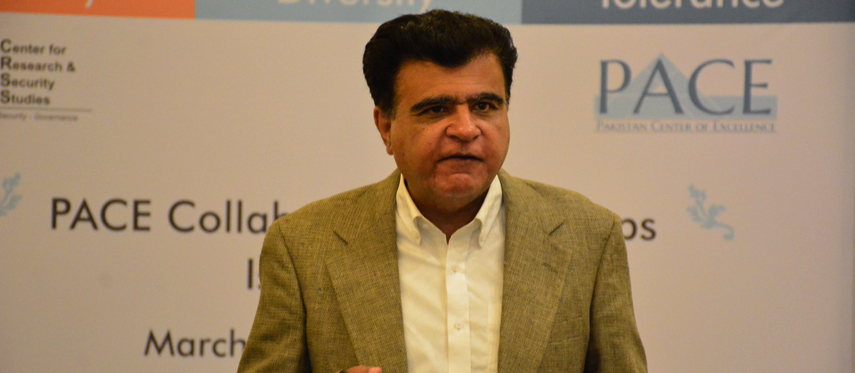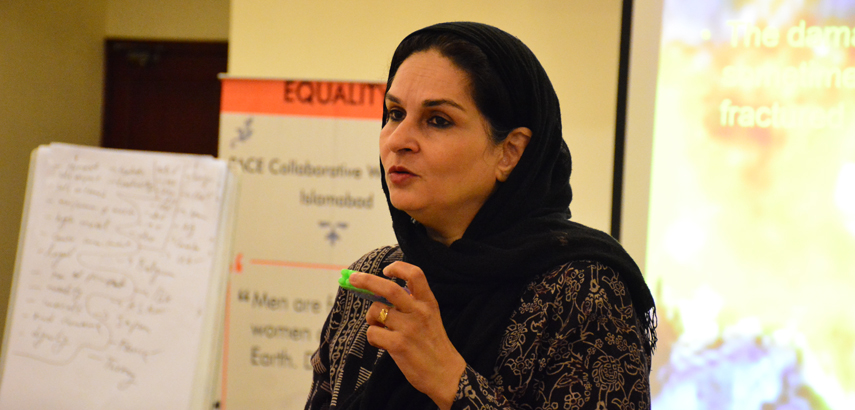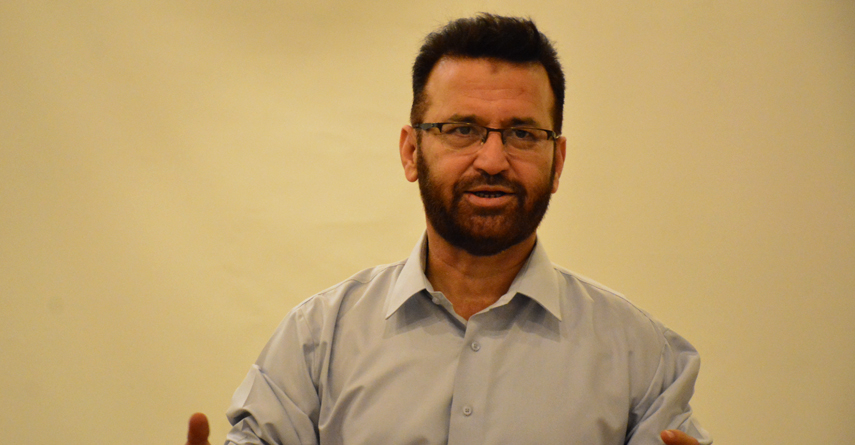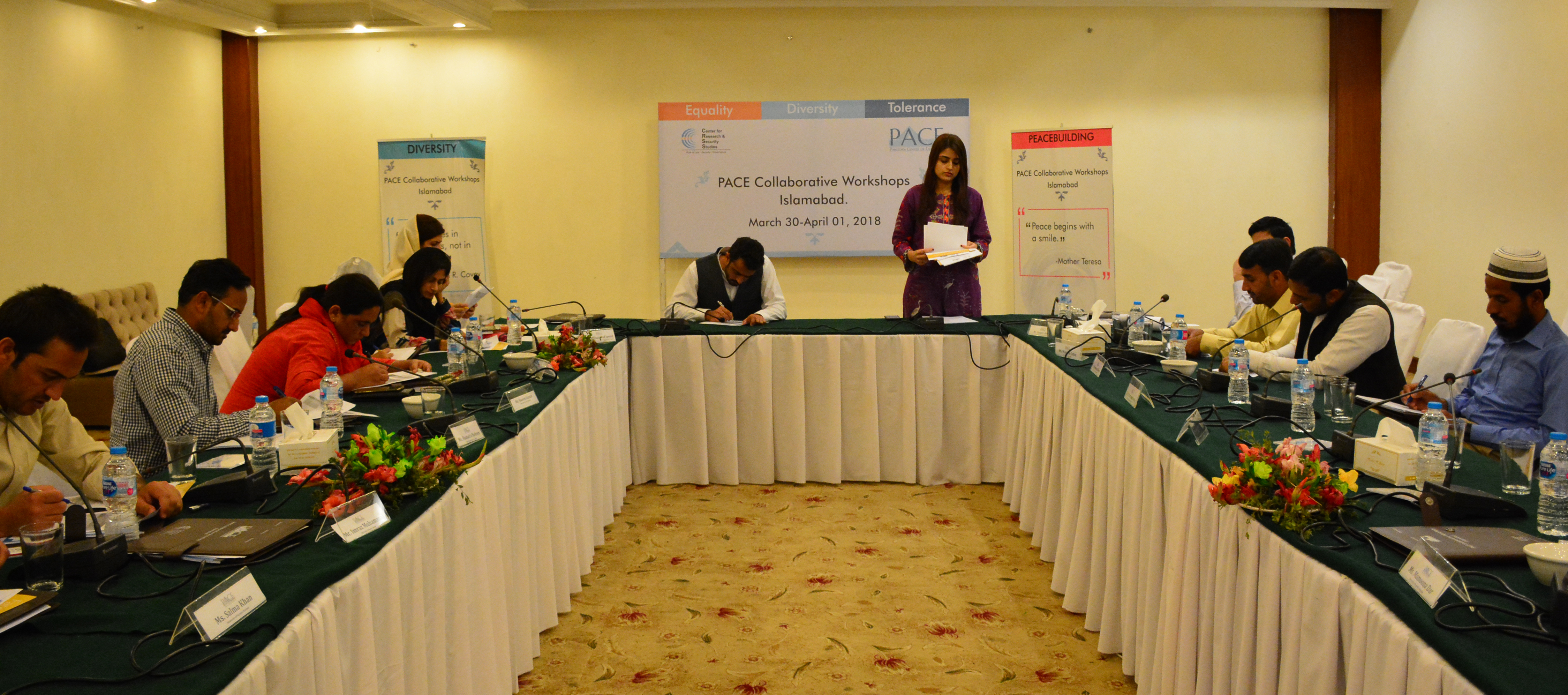The Center for Research and Security Studies (CRSS) conducted the 28th three-day PACE Collaborative workshop for young university lecturers and professors from March 30 – April 1, 2018, at Hill View Hotel, Islamabad. The workshop was conducted under the umbrella of the Pakistan Center of Excellence (PACE), a counter-radicalization, pluralistic values focused project, in collaboration with the Dutch Government. Participants included young university lecturers and professors from all across Pakistan including Sindh, Balochistan, Punjab, KP, AJK, and FATA.
OPENING
Mr. Imtiaz Gul, Executive Director, CRSS welcomed participants to the workshop, saying that PACE is put together by CRSS to counter radicalization, inculcate critical thinking, question preconceived notions and narratives, and embed the national discourse in constitutionalism and the rule of law. He elaborated the objectives of the training saying equal citizenry is a concept which is guaranteed in all the constitutions of the developed countries, including Pakistan. This workshop is designed to ponder on the issues we face in daily life but not on the basis of religiosity, we only have to deal with the twenty fundamentals rights entitled to the citizens of Pakistan in the constitution. Adherence to the constitution ensures social cohesion. He said that the primary objective of the workshop was to trigger critical thinking through a discourse anchored in fundamental global values such as socio-political diversity, acceptance of diversity, rule of law and equal citizenry. The idea is to create a critical mass of young leaders equipped with the skills to critically analyze issues, look at each other as equal citizens, and correct misperceptions about marginalized communities.
Ms. Kishwar Sultana
Ms. Kishwar Sultana was the first speaker on the first day and spoke on the topic of respect of diversity, rights and opinions. She elaborated the discussion saying that diversity is valuing the differences between the people and ways in which those differences contribute to healthy relations. It refers to the ways that individuals are unique and differ from one another and embracing and celebrating the differences we all embody.
Ms. Sultana detailed about opinions saying it can be a view or judgement formed about something, not necessarily based on fact or knowledge. She also discussed the different identities a human being is identified with such as gender, name, cast, religion, nationality, race, political background, character and ideology. One can have multiple identities and different Identities are based on different Ideologies. Ideologies conflict with each other; for example Rajput identity conflict with Muslim Identity, similarly peace activist Ideology conflict with gender identity. These differences make us different and it is diversity.
She elaborated that differences are not inequalities unless they systematically disadvantage one group in terms of opportunities. According to United Nations Declaration of Human Rights “all human beings are equal in rights and dignity”. No one has any superiority over anyone based on anything.
Dr. Shoaib Suddle
Dr. Shoaib Suuddle kicked off his session on the topic of “rule of law.” He talked about transparency, predictability, stability, and accountability as major elements required for the establishment of rule of law. He said that we won’t be able to make everyone answerable before law until we follow these rules in our daily lives. All the religions give us a certain kind of code of conduct to have a comprehensive idea of the do’s and don’ts.
Dr. Tauqeer Hussain
Dr. Tauqeer Hussain was first speaker on the second day and kicked off his session on the topic of “National Security and Elements of Integrity for a Nation.” He described few elements for the integrity of an individual as follow:
- Honesty
- Not corrupt
- Truthful
- Competent and resourceful (not dependent on others)
- Believes on merit rather nepotism
- No criminal record
- Respect for all regardless of Politico-religious identity
- Believes on ‘dignity of humanity’
- Holds no gender discrimination
- Diminishes all Ethnic and sectarian elements of distinction in his/ her life
Even good health and education also falls in the integrity of an individual, which are important ingredients to build confidence, mental effectiveness, and physical fitness.
He linked the above mentioned characteristics to the Article 62 and 63 of the Constitution of Pakistan. According to him, these characteristics define a person’s character and personality. After having a detailed session on operationalization of the elements of integrity, Mr. Hussain charted a few elements of integrity for a nation which were agreed upon by the participants as well. These elements are as under:
- health insurance
- free education
- adequate housing facility
- employment opportunities for all
- social cohesion
- entertainment facilities
- community engagement programs
- State allowances
- innovation
- research and development
- science and technology
- strong institutions
- strong military
- strong economy
- stable political system
- security for all
- justice for all
- public transportation
- secularism
- freedom of speech and work
- liberty
- pursuit of happiness
- equal citizenship
- provision of social and political rights
- free and fair elections
- good governance
- absence of nepotism and corruption
- absence of violence
- absence of fundamentalism, extremism, and terrorism
- democratization rather personalization
- Sense of constitutionalism rather nationalism, etc.
Dr. Niaz Murtaza
Mr. Niaz Murtaza shared his views on the concept of democracy and good governance. He said that any institution at its initial stage is never stable, and the same is the case with democracy. But once it is stable and mature, democracy starts delivering. “When we look back at the history of Pakistani politics, Pakistan has never been stable,” he added, “It could never see the fruits of stable and mature democracy. Political scientists state that from stable institutions emerge egalitarian societies. Egalitarian societies are the ones where people have equal access to education, capital, opportunities and freedoms. In such societies, strong institutions, able leadership and good governance emerge and development takes place.”
Ms. Humaira Masihuddin
Ms. Humaira Masihuddin kicked off her session speaking on the theme of ‘Pluralism and Multiculturalism with Reference to Islam’. She said that human beings belong to one origin and one place, and no purely homogeneous society exists in the modern world. Most societies consist of different ethnic groups. She defined minorities as a group of people who are singled out from the other groups and are treated differently because of their physical or cultural characteristics. “Minority is a subordinate group as opposed to the dominant group. The concept of multiculturalism revolves around a society with heterogeneous beliefs and set of ideas. Multiculturalism makes a society diverse. Respect for diversity shapes coexistence, peace, and harmony under a political and institutional framework. Differences are not challenges and do not impose any limitation on growth of an individual or society. Every individual has a right to be different and be respected by all. In Islam, the concept of diversity is clearly inclusive,” she continued. In the Quran, she said that humans are addressed to treat one another without any discrimination and respect each other’s beliefs and should never use abusive language or show disrespect towards others. If we look at the character of the Holy Prophet (PBUH), it is evident how He always respected the non-Muslims in Mekkah and Medina. Even on the day Mekkah was conquered by Muslims, Prophet (PBUH) forgave all His enemies for the harms that they had inflicted on Him. Ms. Humaira also made note of the last sermon of the Holy Prophet that said “All mankind is from Adam and Eve, an Arab has no superiority over a non-Arab nor a non-Arab has any superiority over an Arab; also a white has no superiority over black nor a black has any superiority over white except by piety (taqwa) and good action”. In short, Islam is the religion of tolerance and coexistence, love and peace for others regardless of their religion or ethnicity.
Mr. Safiullah Gul: Motivation and Leadership
Mr. Safiullah Gul was the last speaker of the workshop and spoke on the topic of ‘Leadership and Motivation’. He began with the saying that “he who fails to plan actually plans to fail” and shared stories of people who alone have changed the course of history, with motivation and persistence, despite all the opposition.
He said that the successful leadership determines the extent of efforts directed towards a certain goal. He presented his model of goal-seeking i.e. activation, persistence and intensity. “Being alone doesn’t actually matter if you have goals and objectives set in your mind. To achieve these goals, you actually need to overcome your fears and insecurities. An individual sometimes can set an example and be motivation for others”, he shared.
The session, filled with activities to enhance creative and critical thinking, focused on looking at things from a slightly different perspective to encourage problem-solving.
CLOSING
Ms. Farhana Kanwal, Project Coordinator, PACE, in her concluding remarks, insisted that there is a dire need to revisit the widespread pre-conceived notions that have been passed through cultural values in the society over generations. Teachers, with the responsibility of imparting values to the young generation in educational institutions, are the most valuable engines that can challenge common negative narratives that promote hatred and bigotry. She said that teachers have the ability to shape an entire generation’s mindset to propagate tolerance, diversity and equality.
Ms. Zehra Zaidi, Project Coordinator shared that participants need to conduct these activities with their students to inculcate adherence to the rule of law and equal citizenry. CRSS provides financial and logistic support in this regard to lecturers and professors so that they can foster the universal ideals of tolerance and diversity in the young generations.

